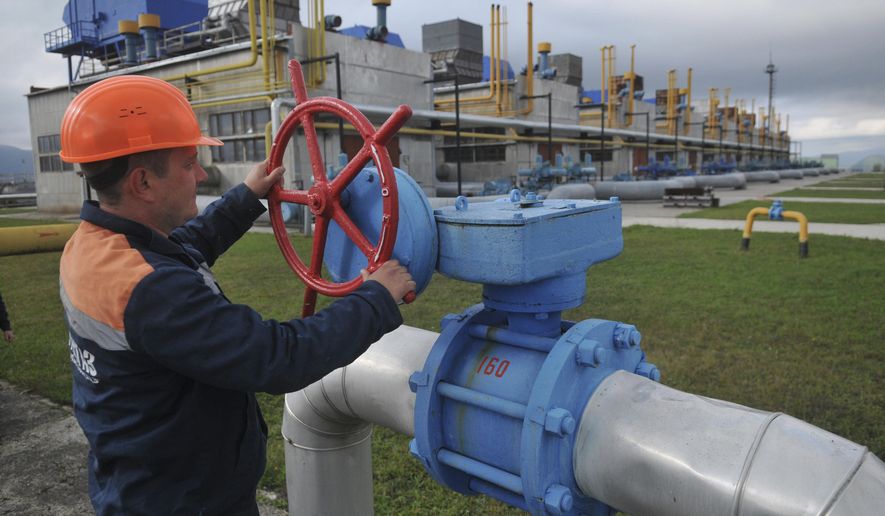The Biden administration is talking with energy companies and major gas-producing nations to ramp up supply in case a Russian invasion of Ukraine leads to winter fuel shortages in Europe, a senior administration official told reporters Tuesday.
Global leaders fear Russia could weaponize its natural gas deliveries to Europe if the West imposes harsh sanctions on Moscow over a potential attack on Ukraine. Russian companies supply roughly a third of the natural gas used by Europe.
“We’ve analyzed the impacts of potential disruptions, and we’re going to work to ensure Europe has alternative energy supplies,” the official said on a conference call with reporters.
The White House concern over Moscow weaponizing its energy sector comes more than six months after the Biden administration waived Trump-era sanctions on company building Nord Stream 2, a controversial natural gas pipeline between Russia and Germany.
The administration also lifted sanctions on an ally of Russian President Vladimir Putin, who heads the company behind the Nord Stream 2 project.
At the time, the Biden administration said it was the U.S. national interest to waive the sanctions. But the moves also handed Russia a major prize in the energy sector and the potential to control even more of the oil and gas in Europe.
SEE ALSO: Russia threatens retaliation if Ukraine demands not met
The official said the U.S. is exploring contingency options to redirect and increase gas supplies from different parts of the world, but declined to name specific countries and companies with which the U.S. has engaged, citing the “sensitivity” of the talks.
Energy prices have reached record highs around the globe, and Russia’s Gazprom, the giant state-run energy corporation, is producing less than its normal supply targeted for Germany and other Western European markets.
Russian exports of main-grade crude oil will drop to their lowest levels in February, predicts the International Monetary Fund. The world’s second-largest oil exporter will ship 1.31 million barrels a day of its crude next month, the smallest flow since September. Much of that crude is shipped to refineries in northwestern Europe.
The slump coincides with the lowest levels of maintenance at Russian refineries in about two years as the COVID-19 pandemic and rising costs make it difficult to keep crude pumping.
The International Energy Agency accused Russia this month of undermining Europe’s gas supply as tensions over Ukraine simmer. It said Russia could increase deliveries to Europe by at least a third and noted that Moscow is delivering more natural gas to China than its contractual commitment requires.
Moscow insists it has fulfilled its European contracts, but some European lawmakers accuse Russia of using the energy crisis as leverage in talks about Ukraine, NATO and security policy in Eastern Europe.
European leaders are pressuring Germany to stop the Nord Stream 2 gas pipeline. The $11 billion pipeline would run from Russia into Germany, doubling Russia’s gas export capacity to Western European markets.
Nord Stream 2 is completed but not operational. Germany, which pushed allies to support the project, is now considering stopping the pipeline in the event of a Russian attack on Ukraine.
Although the U.S. is preparing for Moscow to exploit its position as a major oil and gas producer in the crisis, the official said, such an action could ultimately harm the Russian economy, which is heavily dependent on its energy sector.
“If [Russian President Vladimir] Putin weaponizes the energy supply, he is creating a major incentive for Europe to accelerate the diversification of their energy supplies away from Russia. And that would further remove an opportunity for Russia to earn revenues on the export side,” the official said.
Russia has moved to cut gas supply to Ukraine in the past. In 2014, Moscow turned off the taps after complaining that Ukraine failed to pay its debts to Gazprom.
Russia took similar actions in 2006 and 2008 to 2009. All three disputes led to gas shortages elsewhere in Eastern Europe because Russia’s main supply lines run through Ukraine to the West.
• Jeff Mordock can be reached at jmordock@washingtontimes.com.




Please read our comment policy before commenting.